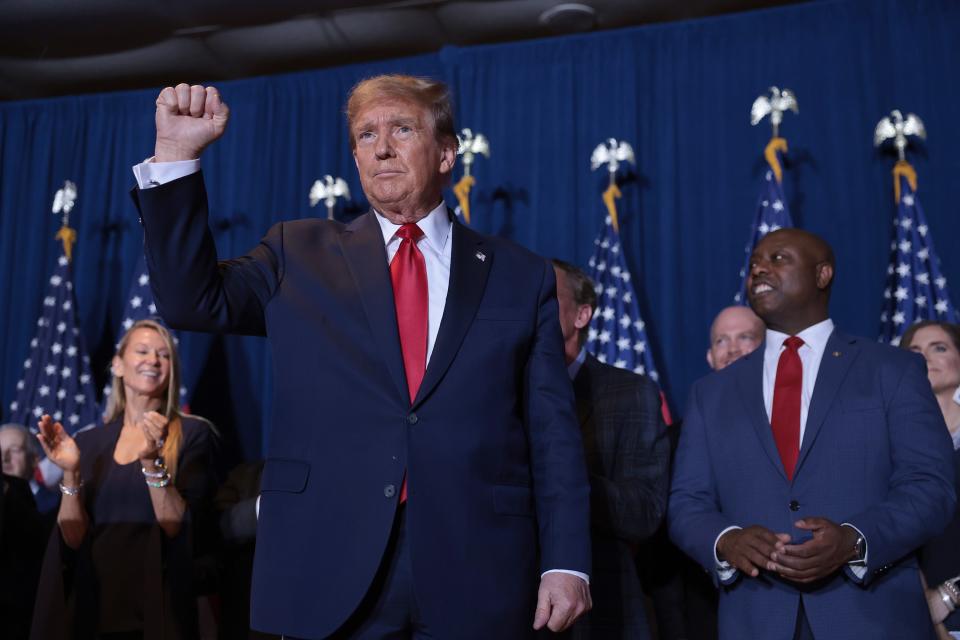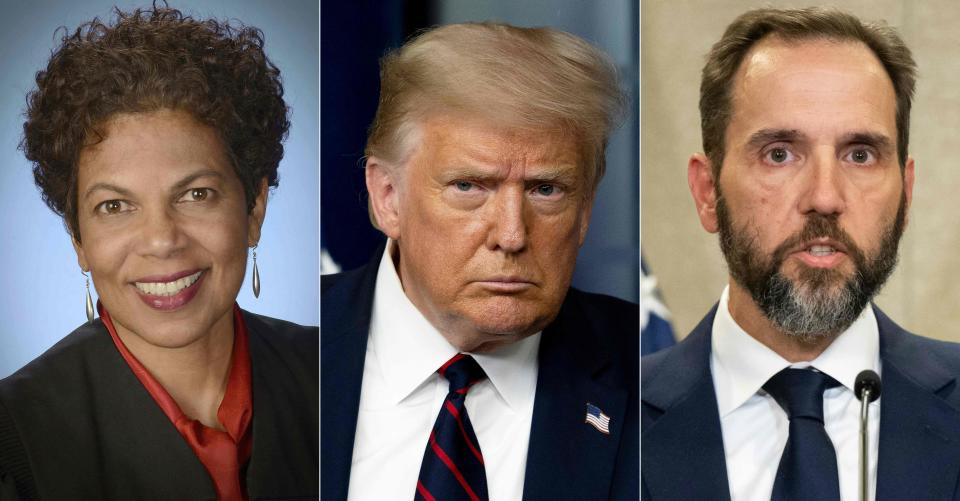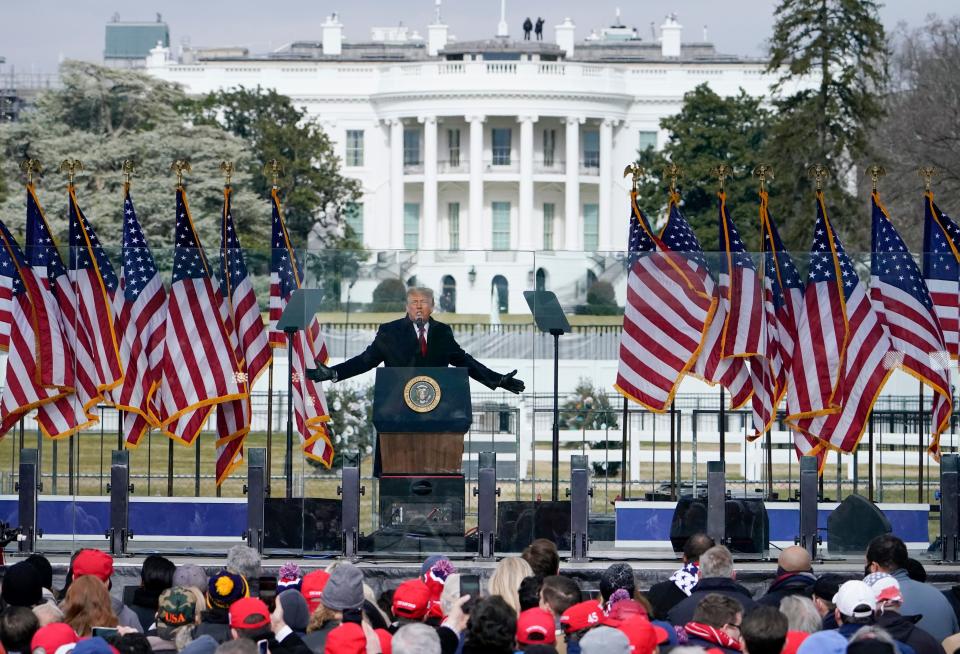Trump's immunity appeal to Supreme Court presents a landmark case: What you need to know
WASHINGTON ? Former President Donald Trump welcomed the Supreme Court’s decision to hear his argument for immunity from federal charges he tried to steal the 2020 election, but legal experts feared a broad protection from prosecution after leaving office could turn presidents into dictators.
The high court’s decision to hear the landmark case in April will delay the high-profile criminal trial for months. It's unclear whether the delay will push the trial beyond the November election.
Trump has repeatedly claimed that the charges are politically motivated. If he returns to the White House, he could appoint an attorney general who would seek to dismiss any pending federal charges. Trump could also simply pardon himself, although his power to do so is debated.
Whatever the decision, the case could set new boundaries between the three branches of government by clarifying when former presidents can be tried in the courts under laws that Congress approved.
Here are the top takeaways from the high court’s decision to hear the case:

How is Trump claiming immunity from prosecution?
Trump faces four criminal cases for charges of election interference in federal court and in Georgia state court, for federal charges of mishandling classified documents and for New York charges of falsifying business records to pay hush money.
In the federal cases, Trump has argued he is completely immune from prosecution because crimes were charged for actions he took as president.
His lawyer, John Sauer, argued at the D.C. Circuit Court of Appeals that former presidents are only vulnerable to criminal charges after the House has impeached and the Senate convicted a president. Sauer said in response to a judge’s questions that a president could kill a political opponent and get away with it if the Senate didn’t convict him.
But the three-judge appeals panel ruled unanimously that former presidents are subject to laws that Congress approves and that courts judge.
"Former President Trump lacked any lawful discretionary authority to defy federal criminal law and he is answerable in court for his conduct," the panel ruled.

Why did Trump welcome the Supreme Court taking case?
Trump welcomed the decision by arguing that without immunity, a president wouldn’t be able to function in the job because he would always be fearful about prosecution over contentious actions.
“Presidents will always be concerned, and even paralyzed, by the prospect of wrongful prosecution and retaliation after they leave office,” Trump said in a post on Truth Social. “This could actually lead to the extortion and blackmail of a President. The other side would say, ‘If you don’t do something, just the way we want it, we are going to go after you when you leave office, or perhaps even sooner.’”
But legal experts contend such an expansive view of immunity would leave presidents unaccountable. Joyce White Vance, a former U.S. attorney, said “this isn’t a hard case” because providing a president immunity for trying to steal an election “has to be a loser.”
“If not, our claim to be a democracy is no longer viable,” Vance said in a post on X, formerly known as Twitter.
McQuade, another former prosecutor, said a Supreme Court decision in spring would still allow Chutkan to begin a trial in August or September and finish it before November.
"I think there is time for the case to be decided and then tried before the election," McQuade said.

Why is the Supreme Court hearing Trump's appeal now?
Justice Department special counsel Jack Smith had tried to get the high court to weigh in earlier but was rebuffed.
After the trial court judge ruled in December that the presidency doesn’t confer a lifelong “get-out-of-jail-free” pass, Smith tried to leapfrog the normal appeals process in hopes of getting a final decision so the trial could start in March.
Smith told the justices that the case presents "a fundamental question at the heart of our democracy” that only the Supreme Court can definitively resolve.
The Supreme Court declined Smith’s request without comment. There were no noted dissents.
No justices dissented Wednesday either when the court announced it will decide the immunity issue now that the D.C. Circuit Court of Appeals has acted.
That leaves observers guessing about why they're taking the case. It takes four justices to agree to hear an appeal. A major reason for doing so is if they think the lower court’s decision was wrong. But another is if the issue is of major significance.
"While at least four justices agreed to hear the case, that doesn’t mean four are inclined to accept Trump’s immunity defense," said Barbara McQuade, a law professor at the University of Michigan and former U.S. attorney. "Even Jack Smith argued that this issue is a matter of national import that should be decided by this court, even if only to reject the defense or limit its contours."
The decision to hear the appeal – but do so on an accelerated schedule ? may also have been a compromise if some justices wanted to deny it outright and others wanted full consideration. The fact that the court took about two weeks to decide could indicate there was a lot of back-and-forth.
Alan Morrison, a law professor and associate dean for public interest at George Washington University, said options for the high court’s change of mind include wanting to hear what the circuit court had to say and perhaps playing a “bait and switch” on Smith.
“The fact is this is the worst outcome for him in terms of what could have happened,” Morrison said. “He’s certainly not at fault. I thought it was a bold move to try to get the court to take it.”
How quickly is the Supreme Court acting?
Typically, when a case gets appealed to the Supreme Court it can take months and months for a resolution. For example, in a case the justices heard Wednesday on whether the government can ban “bump stocks” on guns, the oral arguments came nearly four months after the court agreed to take the case.
In Trump’s immunity appeal, oral arguments will happen in about half that time.
“This is still a very expedited timetable for a major historic case at the Supreme Court,” Norm Eisen, who served as special counsel to the House of Representatives' first impeachment of Trump, said on CNN.
Still, Smith this month had urged the court to act even sooner if they now wanted to hear the appeal. He was hoping for oral arguments in March, not April.
And it can take months for the justices to issue an opinion after hearing a case.
Delays could mean Supreme Court tells voters it's 'up to you,' expert says
The trial will be delayed, but it’s not clear for how long.
U.S. District Judge Tanya Chutkan scheduled the trial for March 4. But the dispute over immunity has halted action in the case indefinitely.
The justices agreed to hear the case the week of April 22, which means a decision could come in May or June. If the trial can proceed after the high court’s decision, there would still be about two months of preparation for trial, under Chutkan’s earlier schedule for the case.
Prosecutors have estimated their case could take four to six weeks, then Trump’s defense could present its arguments. The election interference trial could still happen before the November election, but the longer the Supreme Court takes to rule on immunity, the smaller the chances for a verdict before voting.
“The Supreme Court’s message to us is, ‘Hey voters, we’re leaving this up to you,’” Vance added on X.
Trump has other trials pending
Trump has a variety of civil and criminal trials pending as he hashes out the immunity claims with the Supreme Court. He is appealing civil verdicts totaling more than $500 million from columnist E. Jean Carroll and New York Attorney General Letitia James.
Among criminal cases, Trump’s New York trial on charges of falsifying business records is scheduled March 25 and could last a couple of months.
Trump’s federal trial on charges of hoarding national defense records after leaving the White House is tentatively set for May 20. But U.S. District Judge Aileen Cannon set a scheduling hearing Friday to discuss pretrial preparations and the date could change.
Trump has asked Cannon to dismiss those charges based on immunity and her decision is pending. Trump contends that he designated records marked classified as personal records under the Presidential Records Act, so he was free to take them with him to Mar-a-Lago.
Prosecutors have disputed the records containing some of the country’s most important national security secrets were personal and said there was no documentation that they had been declassified.
In Georgia, Trump faces racketeering charges without a trial date set. Fulton County District Attorney Fani Willis asked for an Aug. 5 trial, but the judge hasn’t set a date yet. Trump is trying to disqualify Willis, with closing arguments in that dispute scheduled Friday.
How has Trump fared before the Supreme Court?
Trump reshaped the Supreme Court, giving it a potent conservative supermajority that has made major policy decisions, most notably overturning the 5-decade-old decision that made abortion legal nationwide.
But when it comes to Trump’s personal issues, he hasn’t gotten a lot of love.
After Trump lost reelection in 2020, the court threw out a Texas lawsuit aiming to overturn the results in four battleground states.
The court has also allowed New York City prosecutors and Congress to get his tax records and didn’t stop the congressional committee investigating Jan. 6 from accessing presidential documents. The justices also declined Trump’s request to get involved in the dispute over classified documents seized at his Mar-a-Lago resort in 2022.
But when hearing Trump’s challenge to Colorado’s decision that an anti-insurrection provision of the Constitution makes the former president ineligible to serve again, even the court’s liberal justices sounded skeptical that one state could make such a determination about a national candidate. That decision is pending.
Another Trump case at the Supreme Court Supreme Court grapples with leaving Donald Trump on presidential ballot in Colorado
What are 'official acts' of a president?
In agreeing to hear the case, the Supreme Court appeared to focus on what sort of “official acts” should shield a president from prosecution.
Part of Trump’s argument for immunity is based on one of the high court's earliest decisions, called Marbury v. Madison, which found a president’s official acts “can never be examinable by the courts.” Trump defined official acts broadly to include his campaign-related activities covered in the criminal charges.
But the D.C. Circuit Court of Appeals ruled that former presidents can be tried for official acts because the prosecution by definition means the allegations were carried out in defiance of the law. In Marbury, the Supreme Court found the president is responsible for his conduct and “cannot at his discretion” violate the law.
“Here, former President Trump’s actions allegedly violated generally applicable criminal laws, meaning those acts were not properly within the scope of his lawful discretion; accordingly, Marbury and its progeny provide him no structural immunity from the charges in the Indictment,” the appeals panel wrote.
Morrison, the George Washington professor, said he expects the justices to focus on what actions could be considered official. For example, disputes over whether Trump should have called the National Guard to combat the riot at the Capitol on Jan. 6, 2021, could be considered official acts as commander in chief. But Trump’s reported effort to visit the Capitol during the riot might sound campaign related.
“I think what this question is looking at is the equivalent of what happens in civil liability cases involving the president, which is to zero in on specific acts that the indictment alleges and see whether they are within the outer limits of the president’s authority,” Morrison said. “It’s going to be very tricky.”
This article originally appeared on USA TODAY: Supreme Court Trump immunity case: How the ruling could make history
